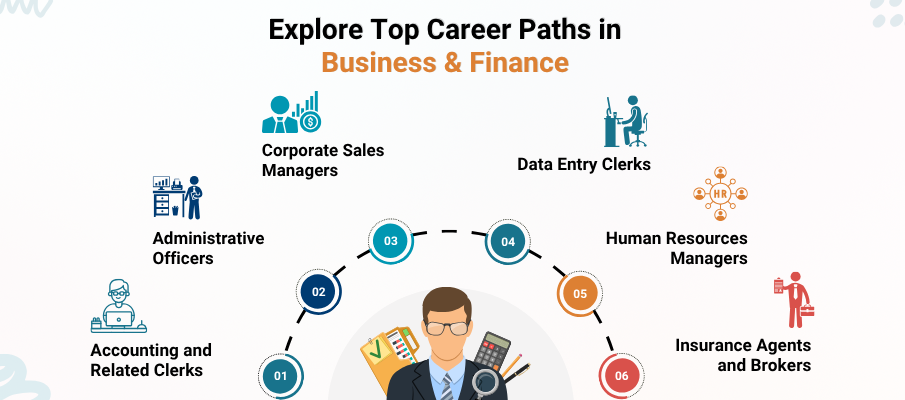Introduction
Modern society depends on Business and Finance as fundamental drivers of global advancement. Business and Finance activities throughout the metropolitan area of Bengaluru and Mumbai’s financial centre sustain economic progress by enabling innovation and wealth creation. A career in this field presents itself as an intelligent choice for Indian students who are seeking jobs.
Business and Finance prove instantly attractive due to their wide variety of opportunities. Across the Business and Finance sector, there is something appealing to diverse student preferences between numerical interest, market analysis, and personnel direction experience. India’s developing economy and its thriving startup scene produce a rising need for qualified professionals to fill these specialized positions.
This article will guide you through what happens in Business & Finance, what career paths are available, how to get started, and why this field might be your calling.
What Happens in Business & Finance?
Business and Finance might sound like broad terms, and that’s because they are. But in practice, these fields have distinct yet interconnected functions.
In Business, professionals focus on operations, strategy, marketing, sales, and management. It’s about running a company—be it a small shop in any city or a corporate office in Gurugram. Business experts plan, organize, and optimize how companies operate and grow.
On the other hand, Finance is about managing money. This could mean personal Finance (helping individuals manage their money), corporate finance (managing a company’s financial activities), investment banking, or even fintech (financial technology), which is growing rapidly in India.
Here are some key activities that happen in this world:
- Budgeting and Forecasting: Planning for future revenues and expenses.
- Investment Analysis: Making decisions on stocks, mutual funds, or business ventures.
- Financial Reporting: Preparing balance sheets, income statements, and tax filings.
- Marketing & Strategy: Understanding markets and building plans to grow a business.
- Risk Management: Identifying financial or operational risks and finding ways to reduce them.
Whether it’s evaluating the success of a new product or analyzing the stock market’s latest trends, the business and finance world is all about decisions that drive results.
Jobs in Business & Finance

The Indian job market in Business & Finance is as dynamic as the field itself. Whether you’re a fresher out of college or someone looking to make a career switch, there’s a broad spectrum of roles to explore.
How Can You Get Into Business & Finance?
Getting into this field doesn’t always require an MBA, but it helps. What matters most is a strong foundation, practical skills, and the correct exposure. Here’s how you can step into this world:
1. Choose the Right Education Path
- After 12th Commerce: Courses like B.Com, BBA, or Bachelor in Economics are ideal starting points.
- Professional Courses: CA, CFA (Chartered Financial Analyst), CS (Company Secretary), and CMA (Cost and Management Accountant) are prestigious and career-defining.
- Postgraduate Degrees: MBA in Finance, Marketing, or Strategy from reputed institutes (like IIMs, ISB, or XLRI) opens doors to senior roles.
- Short-Term Certifications: NISM (for the stock market), NSE courses, or foreign certifications like ACCA, CPA are also valuable.
2. Build Practical Skills
- Learn tools like Excel, Tally, Power BI, or financial modelling software.
- Improve communication, presentation, and analytical thinking.
- Stay updated on current affairs, especially about the economy, budgets, markets, and global trade.
3. Gain Experience Early
- Internships in banks, startups, or finance departments of companies.
- Freelancing or small projects for startups can also give you a head start.
- Join student communities, attend finance conclaves, and participate in competitions.
4. Stay Curious and Keep Learning
The Business & Finance world evolves quickly. Digital banking, UPI innovations, cryptocurrency regulation, ESG investing—there’s always something new. The more you learn, the more valuable you become.
Conclusion
Choosing a career in Business and Finance is not just about chasing money—it’s about being at the centre of change. It’s about solving real problems, making meaningful decisions, and helping people and organizations grow.
For Indian students and professionals, the timing couldn’t be better. India’s economy is expanding, digitalization is transforming traditional roles, and the world sees India as a hub of innovation and talent.
So, whether you dream of starting your own company, working at a global bank, or becoming a financial expert who helps families secure their futures—Business & Finance can take you there.
Your journey begins with curiosity and ambition. The rest? That’s where planning, persistence, and passion come in.



